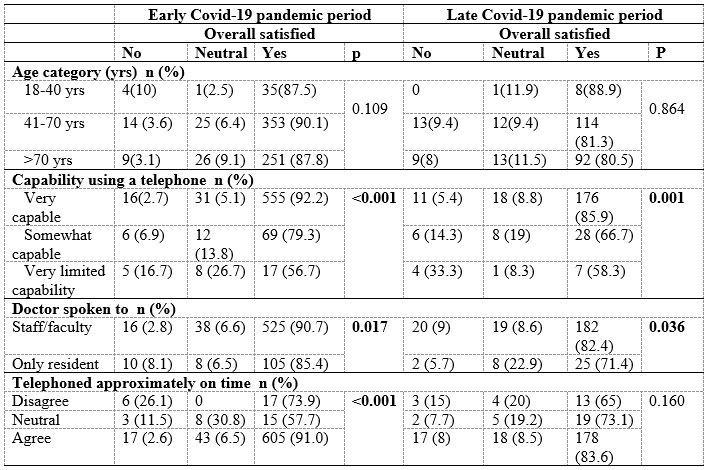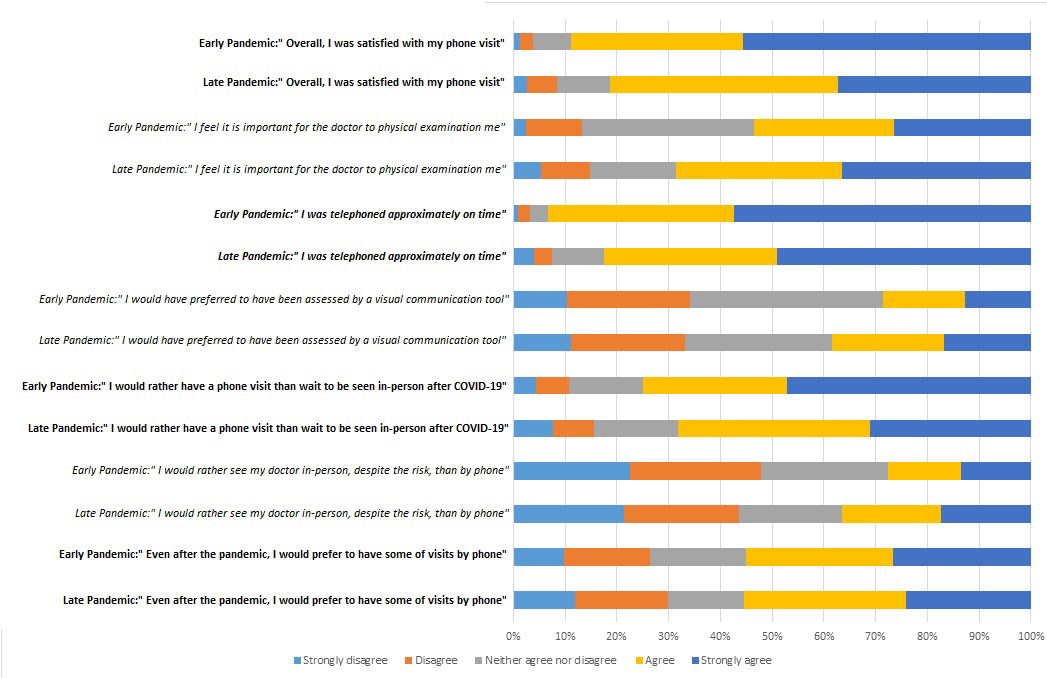Session Information
Session Type: Poster Session C
Session Time: 1:00PM-3:00PM
Background/Purpose: The COVID-19 pandemic has dramatically changed the delivery of healthcare, with virtual care becoming the new standard. In the early stages of the pandemic, physicians were very creative to rapidly adapt to virtual care and studies reported high levels of patient satisfaction. It is unclear whether this high level of satisfaction would be maintained long term, after patients experience multiple virtual visits. We aimed to compare patients’ satisfaction with virtual visits in the early and late period of the Covid-19 pandemic and to determine the impacting factors in patients’ satisfaction.
Methods: We sent patient satisfaction surveys with virtual visits to patients who had at least one virtual visit during the early Covid-19 pandemic (May 2020-Sept 2020). Patients who agreed to participate in an extension study received a similar survey to reflect their satisfaction levels for their later visits between Aug 2021-May 2022. Chi-square tests was used for comparisons for early vs late pandemic satisfaction levels and factors impacting the satisfaction levels were investigated using multivariate logistic regression analysis.
Results: A total of 741 and 270 patients responded to surveys in the early and late Covid-19 pandemic periods respectively. Patient demographics for both periods were similar for age, sex and diagnosis (table-1-2). Overall satisfaction levels decreased in the later stages in comparison to the early stages with 89% vs 81.2%, respectively, p=0.003) patients reporting they were satisfied to very satisfied with virtual care. Despite the reduced satisfaction levels in the late period, 55.5 % of the patients still declared their willingness to continue with virtual care even after the pandemic, a similar result to early pandemic (Figure). In multivariate analysis, speaking with a rheumatologist (p=0.035; OR (95%CI) 1.921 (1.047-3.526)), being called on time (p< 0.001; OR (95%CI) 4.807(2.330-9.915)) and capability of using phone (p< 0.001, OR (95%CI) 4.361(2.503-7.597)) were found to be associated with overall satisfaction in the early period. In the late Covid-19 pandemic period, being called on time (p=0.038; OR (95%CI) 2.333(1.046-4.768)) and capability of using phone (p=0.001; OR (95%CI) 3.516 (1.729-7.150)) were found to be associated with overall satisfaction. However, there was no association between speaking with a rheumatologist vs a resident and overall satisfaction in the late Covid-19 pandemic period (p=0.263; OR (95%CI) 1.639(0.690-3.892)).
Conclusion: Our results suggested that while the patients’ satisfaction with the virtual visit decreased slightly over time, approximately 80% of the patients still are satisfied with virtual care. In addition, more than half of the patients support ongoing virtual visits after the pandemic. This study has important implications for policy decision makers as they consider resource allocation for long term virtual care.
To cite this abstract in AMA style:
Gazel U, Han T, Acikgoz S, Swami T, goldhar H, Shah U, Chowdhury R, Milman N, Maltez N, Ivory C, Humphrey-Murto S, Aydin S. Is Virtual Care Here to Stay? : Rheumatology Patients’ Satisfaction in Early vs Late Pandemic [abstract]. Arthritis Rheumatol. 2022; 74 (suppl 9). https://acrabstracts.org/abstract/is-virtual-care-here-to-stay-rheumatology-patients-satisfaction-in-early-vs-late-pandemic/. Accessed .« Back to ACR Convergence 2022
ACR Meeting Abstracts - https://acrabstracts.org/abstract/is-virtual-care-here-to-stay-rheumatology-patients-satisfaction-in-early-vs-late-pandemic/



